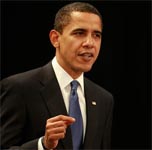US breathes new life into global disarmament campaign
 New York - The United Nations Security Council, led by US President Barack Obama, will hold a high-profile session on nuclear non-proliferation and disarmament on Thursday, which has given some hope to advocates of a nuclear-free world.
New York - The United Nations Security Council, led by US President Barack Obama, will hold a high-profile session on nuclear non-proliferation and disarmament on Thursday, which has given some hope to advocates of a nuclear-free world.
The event will mark a rare meeting of leaders of the 15-member council and the first time a US president chairs the UN's top decision-making body. It is being held during the annual gathering of world leaders in New York for the opening of a new session of the UN General Assembly.
There will be a separate two-day conference designed to breathe new life into a treaty that bans the testing of nuclear weapons.
The United States is one of nine countries with nuclear technology that is still blunting the entry into force of the Comprehensive Test Ban Treaty (CTBT). The US never ratified the treaty, but Obama is giving it a second chance by pushing hard for the Senate's approval.
Attending the council meeting along with Obama will be some of the world's most powerful leaders, including presidents Hu Jintao of China, Nicholas Sarkozy of France, Dmitry Medvedev of Russia and British Prime Minister Gordon Brown. Others include new Japanese Prime Minister Yukio Hatoyama and Libya's leader Moammar Gaddafi.
A draft Security Council resolution submitted by the US urges all states to refrain from conducting nuclear test explosions and to sign and ratify the CTBT, "thereby bringing it into force at an early date."
The draft, which is expected to be approved by the world leaders at the council meeting Thursday, also upholds the Nuclear Non- Proliferation Treaty (NPT), which will come under review in 2010.
US Secretary of State Hillary Rodham Clinton will lead a separate conference on CTBT at UN headquarters on Thursday and Friday. She will join foreign ministers from more than 100 governments.
The high-profile US presence has given hope to disarmament advocates that global efforts to end nuclear explosions and rid the world of nuclear weapons will finally gain traction.
It is also part of a broader push by the United States to reduce nuclear weapons stockpiles. Obama and Medvedev will meet Wednesday on the sidelines of the UN summit, ramping up their efforts to reach a new Strategic Arms Reduction Treaty by year end.
In a major speech in Prague in April, Obama called for a world free of nuclear weapons. He pledged to "immediately and aggressively" pursue US ratification of CTBT.
The US efforts are in part designed to help convince developing countries not to pursue their own nuclear programmes.
But those hopes could be dashed by North Korea, India and Pakistan, who have not signed the test-ban treaty and where ratification is a long shot. The others yet to approve the CTBT are China, Egypt, Indonesia, Iran, Iraq and Israel.
The US Senate, which rejected the treaty after former president Bill Clinton signed it in 1996, could also still prove a spoiler. Obama is only beginning to mount his renewed push for ratification.
The nine countries still not ratifying CTBT are among the world's 40 countries with nuclear technology that must approve the treaty for it to become effective.
The CTBT conference, which will be chaired by French Foreign Minister Bernard Kouchner and his Moroccan counterpart, Taleb Fassi Fihri, will issue a final declaration calling on the nine countries to sign and ratify the treaty.
The treaty bans all nuclear tests worldwide. It was opened for signatures in the late 1990s and has been signed by 181 countries, 149 of which have ratified.
Of the world's five major declared nuclear powers, Russia, France and Britain have ratified the treaty, while the US and China have not.
The CTBT's office in Vienna is already building a verification network across the globe to monitor compliance. So far, 250 of the needed 337 facilities have been built to look for any sign of nuclear explosions on the ground, below the earth and in the atmosphere.
US Nuclear Security Administrator Thomas Paul d'Agostino this month became the first US official to visit the Vienna office. He said the US National Academy of Sciences has been tasked with reviewing the treaty and providing US legislators with information to begin the ratification process. (dpa)